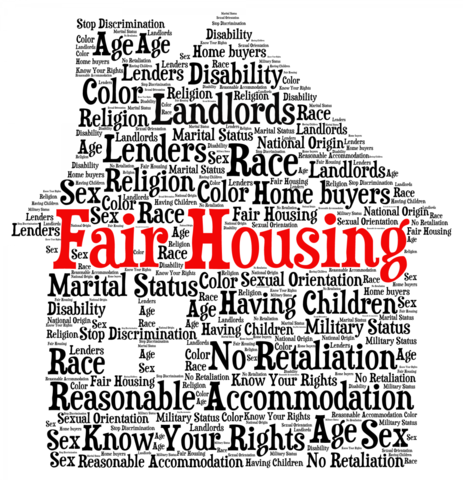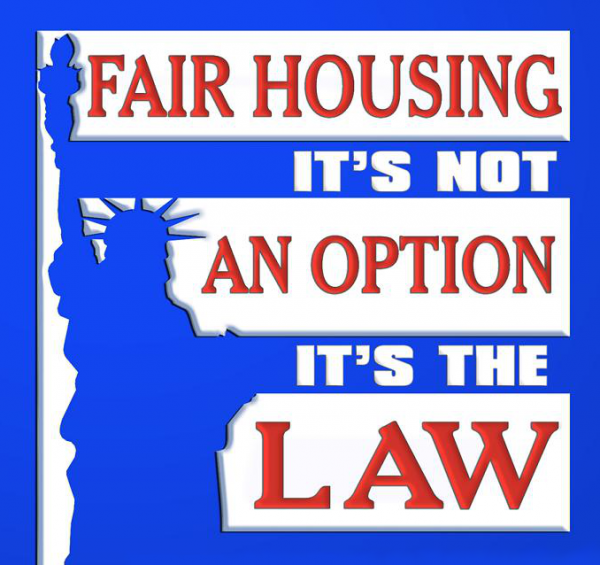What is Housing Discrimination?
The Department of Fair Employment and Housing (DFEH) is responsible for enforcing state fair housing laws that make it illegal to discriminate because of a protected characteristic (see “What is Protected”). The law applies to landlords, tenant screening companies, property management companies, real estate agents, home sellers, builders, mortgage lenders, and others. The law prohibits discrimination in all aspects of the housing business, including: renting or leasing, sales, mortgage lending and insurance, advertising, practices such as restrictive covenants, and new construction.

WHAT DISCRIMINATION LOOKS LIKE?
The Fair Employment and Housing Act prohibits those engaged in the housing business – landlords, real estate agents, home sellers, builders, mortgage lenders, among others – from discriminating against tenants or homeowners listed in the section “Who is protected?”
It is also illegal for cities, counties, or other local government agencies to make zoning or land-use decisions, or have policies, that discriminate against individuals based on those traits.
Violations of the anti-discrimination law include the following:
-
Refusal to sell, rent, or lease rooms, apartments, condos or houses to protected individuals
-
Refusal to negotiate for the sale, rental, or lease of housing
-
Representation that a housing accommodation is not available for inspection, sale, or rental when it is in fact available
-
Denial of a home loan or homeowner’s insurance
-
Cancellation or termination of a sale or rental agreement
-
Policies, practices, terms, or conditions that result in unequal access to housing or housing-related services
-
Offering inferior terms, conditions, privileges, facilities or services in connection with the housing accommodation
-
Sexual harassment involving unwanted sexual advances or requiring sexual favors for housing rights or privileges
-
Refusal to permit, at a disabled tenant’s expense, reasonable modifications when necessary to accommodate a disability
-
Refusal to make reasonable accommodations in housing rules, policies, practices, or services where necessary to afford a disabled person equal opportunity to use and enjoy a dwelling
-
Retaliation against someone filing a complaint
-
Overly restrictive rules limiting the activities of daily life for families with children, including where children are allowed to play
John, who is a Black man, speaks to a prospective landlord on the phone about leasing an apartment. On the phone, the landlord seems eager to rent to John, but when John meets with the landlord in person to fill out an application, the landlord’s attitude is entirely different. A few days later, John receives a letter saying that his application was denied because of a negative reference from his current landlord. John is surprised because he never had problems with his landlord, and his landlord swears she was never contacted for a reference. John suspects that the real reason he was denied the apartment was because he is Black, so John files a complaint with HUD. HUD investigates and it turns out John is right – the landlord’s files show a pattern of discrimination because of race and color.
Jane is a Muslim woman who wears a hijab. Jane walks into the leasing office for a large apartment building because she saw a sign in the building’s window advertising several available units. Jane introduces herself to the leasing officer, who immediately says there are no units available. Jane asks to be put on the waiting list, but she never receives a call. Jane files a complaint with HUD because she suspects that the leasing officer does not want to rent to her because she is Muslim. HUD investigates and it turns out Jane is right – other employees of the building give HUD information that substantiates Jane’s claim of religious discrimination.
John, who is an Asian man, meets with a real estate broker to discuss purchasing a house for his family. When John names the neighborhood that he is interested in, the broker asks John if he is sure that his family will feel comfortable there. The broker tells John that she has a wonderful listing in another neighborhood where there are more “people like them.” When the broker takes John to see the house, John notices that the residents of the neighborhood appear to be mostly Asian. John files a complaint with HUD because steering someone to a certain neighborhood because of his race is a form of race discrimination.
Jane has a Housing Choice Voucher (Section 8), but one month she falls behind on her portion of the rent. When Jane asks her landlord if he will give her a few more days, her landlord says yes but only if she will go out with him. Feeling she has no choice, Jane says yes. Over the next few days, Jane’s landlord sends her sexually explicit text messages even though Jane tells him to stop. Jane’s landlord tells her that if she does not go out with him again he is going to evict her and she will lose her voucher. Jane files a complaint with HUD because sexual harassment is a form of sex discrimination.
John, a person with a disability who uses a wheelchair, views a condominium he is hoping to purchase in a new multistory building. When John arrives, he finds there are no accessible parking spaces in the building’s parking lot. When John tries to enter the unit, his wheelchair can barely fit through the door and he bangs his arms on the way in. Inside the unit, the thermostat and light switches are all too high for him to reach. The building has a fitness room, but he cannot look at it because the only way to get to the fitness room is to go up steps. John files a complaint with HUD because failing to comply with accessibility requirements is a form of disability discrimination.
Jane has a developmental disability that affects her capacity to manage her own finances. Jane tells her building manager that her mother will be paying her rent for this reason and asks if all notices relating to her rent can be sent to her mother. The building manager tells Jane that the management company has a policy of only sending notices to residents, no exceptions. Several months later, Jane receives an eviction notice because her mother had not known that Jane’s rent had been increased. Jane files a complaint with HUD because denying a reasonable accommodation is a form of disability discrimination.
John has three teenage children. John’s building has a patio with picnic tables, and one day John’s children decide to have lunch there with some of their friends. The next day, John receives a notice from the homeowners association informing him that the building rules say that the patio is for adult-use only and that he needs to make sure his children do not violate the building rules. John files a complaint with HUD because building rules that discriminate against children are a form of familial status discrimination.
Jane and John are filling out an application for a mortgage at their local bank. Their loan officer notices that Jane is visibly pregnant and asks whether she will be taking maternity leave. When Jane says yes, the loan officer informs the couple that they either have to apply without Jane’s income or wait until she returns from leave. “I’m sorry,” the loan officer says, “but I’ve seen too many women change their mind about going back to work.” Jane and John file a complaint with HUD because the bank’s policy discriminates based on sex and familial status.
John recently moved to the United States from Mexico. One day, John sees that there is a new tenant in the apartment next to his, so he welcomes her to the building. John’s neighbor comments on how nice everyone in the building seems, especially the building manager who offered to waive her security deposit because she seems like a good person. John is surprised because the building manager was short-tempered with him and said that John’s accent made him hard to understand. John later asks around and finds out that the building manager has waived fees and deposits for other tenants he likes, but not for him or other persons from Mexico. John files a complaint with HUD because providing different terms and conditions to tenants because of national origin is illegal discrimination.




